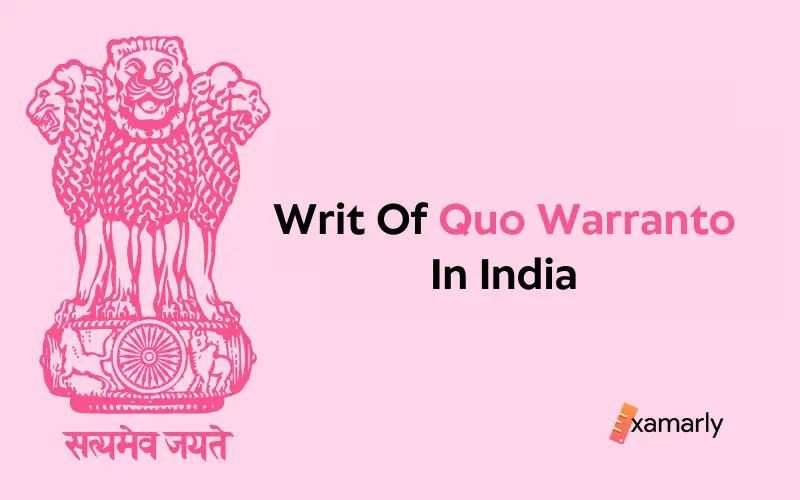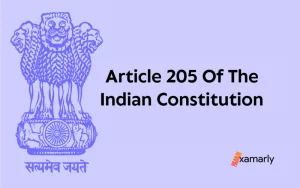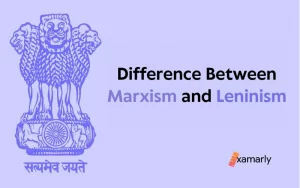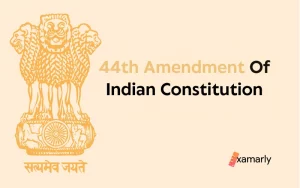A writ of quo warranto in India is a legal order issued by a court or other competent authority to inquire into the legality of a claim to a public office or franchise.
It is issued under Article 226 Of The Indian Constitution by the High Court to inquire into the legality of a person’s claim to a public office.
It is a prerogative writ & is the fifth writ amongst the 5 main Types Of Writs In India.
In this article, we’ll discover all important aspects of the writ of quo warranto in India.
- What Is The Writ Of Quo Warranto In India?
- Writ Of Quo Warranto In India – Issuance
- Who Can File The Writ Of Quo Warranto In India?
- When Can The Writ Of Quo Warranto In India Be Refused?
- Writ Of Quo Warranto In India – Criticisms & Limitations
- Writ of Quo Warranto In India – Important Judgements
- Writ Of Quo Warranto In Other Nations
- Conclusion
- FAQs Related To The Writ Of Quo Warranto In India
- What is the purpose of a writ of quo warranto in India?
- Who can apply for a writ of quo warranto?
- What are the grounds for issuing a writ of quo warranto?
- Can a writ of quo warranto be issued on the court's own motion?
- What is the effect of a writ of quo warranto on a public official?
- What is the time limit for filing a writ of quo warranto?
- What is the role of the High Court in issuing a writ of quo warranto?
What Is The Writ Of Quo Warranto In India?
A writ of quo warranto in India is a legal remedy used to challenge the validity of a person’s claim to a public office or franchise.
It is issued by a court or other competent authority, such as the High Court, under Article 226 of the Indian Constitution.
The writ can be used to inquire into the legality of the appointment or election of a public official, and to challenge the eligibility or disqualification of the person holding the office.
It can also be issued to inquire into the legality of the exercise of a public function or franchise by a corporation or other legal entity.
The writ of quo warranto in India is typically used when there is a dispute over the right to hold a public office or franchise, and when other legal remedies are not available or appropriate.
Writ Of Quo Warranto In India – History
The writ of quo warranto in India has a long history, dating back to the British colonial period.
The writ, which is Latin for “by what warrant,” was originally used by the British courts in India to inquire into the legality of a person’s claim to a public office or franchise.
During the British colonial period, the writ of quo warranto was used to challenge the appointment or election of public officials, such as members of the Indian Civil Service, on the grounds of eligibility or disqualification.
The writ was also used to inquire into the legality of the exercise of a public function or franchise by a corporation or other legal entity.
After India gained independence from British rule in 1947, the writ of quo warranto was retained as a legal remedy under the Indian Constitution.
The Constitution specifically provides for the issuance of the writ of quo warranto under Article 226, which gives the High Courts the power to issue the writ.
The writ of quo warranto in India is a discretionary remedy and its availability depends on the facts and circumstances of each case.
However, it has been used in various cases where individuals, who were not properly elected or appointed to certain office, were challenged and removed from their position.
Writ Of Quo Warranto In India – Modern Developments
In recent years, the writ of quo warranto in India has been used in several high-profile cases in India, including challenges to the appointment of judges and the disqualification of elected officials.
There have been several modern developments in the use of the writ of quo warranto in India, which include:
- Increased use in political and electoral disputes: The writ of quo warranto has been used in several high-profile cases involving political and electoral disputes, including challenges to the appointment of judges and the disqualification of elected officials.
- Use in public interest litigation: The writ of quo warranto has also been used in public interest litigation, where it has been invoked to challenge the legality of government actions, such as the acquisition of land for public projects.
- Use in corporate disputes: The writ of quo warranto has been used in corporate disputes, where it has been invoked to challenge the legality of the exercise of a public function or franchise by a corporation or other legal entity.
- Use in appointment of public officials: The writ of quo warranto has been used in appointment of public officials, where it has been invoked to challenge the legality of the appointment of a public official on the grounds of eligibility or disqualification.
- Use in cases of illegal holding of public office: The writ of quo warranto has been used in cases where a person is holding an office without legal authority, and the court can order the official to vacate the office.
- Interim Reliefs: The High Court in India, while issuing the writ of quo warranto, can also grant interim reliefs to the person challenging the appointment or election of the public official.
These modern developments demonstrate the continued relevance and importance of the writ of quo warranto in India’s legal system, as a means to:-
- Ensure the legality of public office holders and the exercise of public functions & franchises, and
- Provide remedies for individuals and organisations in cases of illegal or wrongful exercise of public powers.
Writ Of Quo Warranto In India – Issuance
The writ of quo warranto in India can be issued against a person who is holding an office without legal authority, or against an entity that is exercising a franchise without legal right.
The writ can also be issued to inquire into the legality of the exercise of a public function by a corporation or other legal entity.
The High Court in India has the power to issue the writ of quo warranto, and the decision of the court is final and binding.
The writ can be issued on the application of any person who is aggrieved by the illegal holding of a public office or franchise, or by any person who has a sufficient interest in the matter.
The writ can also be issued on the court’s own motion, if the court is satisfied that there is a valid ground for inquiry.
It can also be issued to inquire into the legality of the exercise of a public function or franchise by a corporation or other legal entity.
Conditions For Issuing Writ Of Quo Warranto In India
The following are the conditions that must be satisfied for the High Court to issue a writ of quo warranto in India:
- Illegal holding of public office: The writ can be issued against a person who is holding an office without legal authority or against an entity that is exercising a franchise without legal right.
- Lack of alternative remedy: The writ can be issued when other legal remedies are not available or appropriate.
- Interested party: The writ can be issued on the application of any person who is aggrieved by the illegal holding of a public office or franchise, or by any person who has a sufficient interest in the matter.
- Valid ground for inquiry: The writ can be issued on the court’s own motion, if the court is satisfied that there is a valid ground for inquiry.
- Eligibility and disqualification of public officials: The writ can be issued to inquire into the eligibility or disqualification of a public official, on the grounds of non-compliance of rules and regulations of appointment.
- Time-bound: The High Court in India can grant time-bound for the official to vacate the office, if found holding it illegally.
It’s important to note that the writ of quo warranto in India is a discretionary remedy and its availability depends on the facts and circumstances of each case.
The High Court will consider the above conditions and the merits of the case before issuing the writ.
Who Can File The Writ Of Quo Warranto In India?
The writ of quo warranto in India can be filed by any person who is aggrieved by the illegal holding of a public office or franchise, or by any person who has a sufficient interest in the matter.
The following are some examples of individuals or groups who may be eligible to file a writ of quo warranto in India:
- An individual who believes that they were wrongly denied a public office or franchise that they were entitled to hold.
- A person who is challenging the appointment or election of a public official on the grounds of eligibility or disqualification.
- A person who is challenging the legality of the exercise of a public function or franchise by a corporation or other legal entity.
- A person who is challenging the legality of an action taken by a government agency or official.
- An individual who believes that they have been harmed by the illegal or wrongful exercise of public powers.
It’s important to note that while anyone can file a writ of quo warranto, the High Court has discretion to hear or not to hear the case based on the facts and circumstances of the case, as well as if the case has a public interest.
Additionally, it’s also worth mentioning that typically in India, such writs are filed by public-spirited individuals, Non-Governmental Organisations or other groups that are interested in protecting the public interest.
When Can The Writ Of Quo Warranto In India Be Refused?
The writ of quo warranto in India is a discretionary remedy, which means that the High Court has discretion to grant or refuse the writ based on the facts and circumstances of the case.
The High Court may refuse to issue a writ of quo warranto in the following situations:
- Alternative Remedy: If there is an alternative legal remedy available that would be more appropriate to address the issue at hand, the High Court may refuse to issue the writ.
- Lack of Interested Party: If the person or group filing the writ does not have a sufficient interest in the matter, the High Court may refuse to issue the writ.
- Lack of valid ground for inquiry: If the court is not satisfied that there is a valid ground for inquiry, the High Court may refuse to issue the writ.
- Time-barred: If the writ is filed after a significant period of time has passed since the issue arose, the High Court may refuse to issue the writ.
- Public Interest: If the case does not have a public interest and the High Court is not satisfied that the case is of public importance, the court may refuse to issue the writ.
It’s important to note that the High Court has a wide discretion in refusing or granting the writ of quo warranto, and the court will consider the facts and circumstances of each case before making a decision.
Writ Of Quo Warranto In India – Criticisms & Limitations
The writ of quo warranto is an important legal remedy in India, as it allows a court or other competent authority to inquire into the legality of a claim to a public office or franchise, and to challenge the appointment or election of a public official on the grounds of eligibility or disqualification.
Criticisms
However, there are also some criticisms of the writ of quo warranto in India.
1. One criticism is that the writ of quo warranto is a discretionary remedy, which means that the High Court has discretion to grant or refuse the writ based on the facts and circumstances of the case.
- This discretion can lead to inconsistent or arbitrary decisions, and can make it difficult for individuals or organisations to predict the outcome of their cases.
2. Another criticism is that the writ of quo warranto in India is not widely known, and that it is not well understood by the legal profession or the general public.
- This lack of familiarity with the writ can make it difficult for individuals or organisations to know when to seek its remedy.
3. Finally, there are also some criticisms that the writ of quo warranto is not an effective remedy for addressing issues of corruption or abuse of power by public officials, as it is typically used to challenge the eligibility or disqualification of public officials rather than addressing the underlying issues of corruption or abuse of power.
Limitations
Additionally, there are also some limitations to the writ of quo warranto in India.
1. For instance, the writ can only be issued by the High Court, which means that it is not available as a remedy at the lower court level.
- This could limit its accessibility for those who are not able to afford the High court’s fees.
2. Moreover, the writ of quo warranto is not an easy remedy to get, it’s a discretionary remedy and its availability depends on the facts and circumstances of each case.
- It’s therefore not a straightforward remedy and the High court will consider the merits of the case before issuing the writ.
Writ of Quo Warranto In India – Important Judgements
There have been several important judgements related to the writ of quo warranto in India.
Some notable examples include:
- Shivakant Shukla vs. Harish Chandra (1975): In this case, the Supreme Court of India held that the writ of quo warranto can be issued against a public official who is holding office illegally. The court also held that the writ can be issued on the court’s own motion, if the court is satisfied that there is a valid ground for inquiry.
- B. P. Singhal vs. Union of India (2010): In this case, the Supreme Court of India held that the writ of quo warranto can be issued against a judge of the Supreme Court or a High Court on the ground of lack of eligibility or disqualification.
- Subramanian Swamy vs. Manmohan Singh (2012): In this case, the Supreme Court of India held that the writ of quo warranto can be issued against a public official on the ground of fraud or misrepresentation in the appointment process.
- PIL – Supreme Court Advocates-on-Record Association vs. Union of India (2016): In this case, the Supreme Court of India held that the writ of quo warranto can be issued against a judge of the Supreme Court or a High Court on the ground of lack of independence or impartiality.
- R. Gandhi vs. Union of India (2018): In this case, the writ of quo warranto was issued against the Managing Director of a public sector bank, challenging his appointment on the grounds that he was not eligible for the position.
- PIL – Centre for Public Interest Litigation vs. Union of India (2018): In this case, the Supreme Court of India issued a writ of quo warranto against the appointment of the Director of the Central Bureau of Investigation, holding that the appointment was made in violation of the rules and regulations governing the appointment.
These judgements demonstrate the importance of writ of quo warranto as a legal remedy in India, and the various grounds on which it can be issued, including issues of eligibility, disqualification, fraud, misrepresentation and lack of independence or impartiality.
Writ Of Quo Warranto In Other Nations
Quo warranto is a legal concept that allows a government entity to challenge an individual’s or organisation’s right to hold a particular office or franchise.
In the United States, the concept of quo warranto is rooted in common law and is typically brought by the attorney general or other government legal representative.
In other countries, the concept of quo warranto is similar to that in the United States, but the specific procedures and rules for bringing a quo warranto action may vary.
For example, in the United Kingdom, quo warranto actions are typically brought by the Attorney General and can be used to challenge the right of a corporation to exist or the right of an individual to hold a particular office or government position.
In Canada, quo warranto actions are typically brought by the attorney general of the province where the office or franchise in question is located.
In Australia, quo warranto is brought by the attorney general or other government legal representative, and the court has the power to remove the office holder and declare the office vacant.
Conclusion
In summary, writ of quo warranto in India is a legal remedy that allows a court or other competent authority to inquire into the legality of a claim to a public office or franchise, and to challenge the appointment or election of a public official on the grounds of eligibility or disqualification.
The writ continues to play an important role in Indian legal system as a means to ensure the legality of public office holders and the exercise of public functions and franchises.
The discretion of the court in granting or refusing the writ, the lack of familiarity with the writ and the limitations on its accessibility, as well as its inefficiency in addressing issues of corruption or abuse of power are some of the main criticisms.
Related Articles:
- Writ Of Habeas Corpus In India.
- Writ Of Mandamus In India.
- Writ Of Prohibition In India.
- Writ Of Certiorari In India.
FAQs Related To The Writ Of Quo Warranto In India
What is the purpose of a writ of quo warranto in India?
The writ of quo warranto is a legal remedy in India that is used to challenge the validity of a person’s claim to a public office or franchise.
It is issued by a court or other competent authority, such as the High Court, under Article 226 of the Indian Constitution.
Who can apply for a writ of quo warranto?
Any person who is aggrieved by the illegal holding of a public office or franchise, or any person who has a sufficient interest in the matter, can apply for a writ of quo warranto.
What are the grounds for issuing a writ of quo warranto?
A writ of quo warranto can be issued on the grounds of eligibility or disqualification of a public official, or on the grounds that a corporation or other legal entity is exercising a public function or franchise without legal right.
Can a writ of quo warranto be issued on the court’s own motion?
Yes, a writ of quo warranto can be issued on the court’s own motion if the court is satisfied that there is a valid ground for inquiry.
What is the effect of a writ of quo warranto on a public official?
If a writ of quo warranto is issued against a public official and the court finds that the official is holding office illegally, the court can order the official to vacate the office.
What is the time limit for filing a writ of quo warranto?
There is no specific time limit for filing a writ of quo warranto.
However, it is generally advisable to file the writ as soon as possible after the issue arises.
What is the role of the High Court in issuing a writ of quo warranto?
The High Court in India has the power to issue the writ of quo warranto, and the decision of the court is final and binding.






